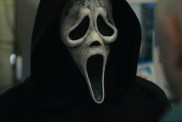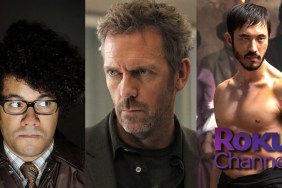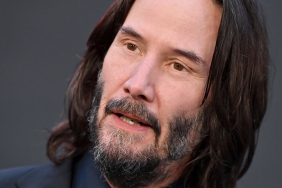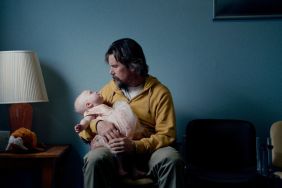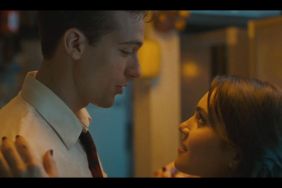One of the standout movies at the 2010 Tribeca Film Festival, at least in terms of narrative films, is Paul Fraser’s directorial debut My Brothers, a warm and funny road trip movie about three brothers who travel across the Irish countryside in a broken-down delivery truck to get a new watch for their dying father.
Although Fraser’s name might not jump out at you, he’s the screenwriter behind a number of the movies directed by one of England’s finest independent filmmakers Shane Meadows, and he’s made quite an amazing debut with material that’s not exactly the easiest to pull off well. Besides being a bonafide road movie, Fraser cast three completely new and unknown actors with Timmy Creed, playing the eldest brother Noel whose father is dying, leaving the family in ruins. After Noel borrows his father’s beloved wristwatch and it’s smashed by bullies, he decides he must replace it before his father dies. Unfortunately, his younger brothers 11-year-old Paudie (Paul Courtney) and 7-year-old Scwally (TJ Griffin) insist on tagging along on Noel’s journey to replace the broken watch, the three of them getting into all sorts of predicaments along the way.
With Creed handling the drama and the two younger boys delivering hilariously eccentric performances, it’s a movie that at times bears resemblances to many crowdpleasing films, from John Carney’s heartwarming Irish indie Once to Garth Jennings’ The Son of Rambow and even a little bit of Little Miss Sunshine, yet still retaining very much its own identity and tone. But he most amazing thing about My Brothers? They finished filming the movie just four months before its premiere at Tribeca.
That’s one of the many things we learned when ComingSoon.net sat down with Paul Fraser to talk about the movie, and of course, the first thing we wondered was why a movie that feels so much like a script Fraser might have written, was actually written by someone else.
ComingSoon.net: I think it’s surprising to some that the first movie you’re directing is from a script that you didn’t write. How did you find this script and decide to tackle it as a director?
Paul Fraser: Yeah, well, I always had the intention to direct at some point. I’d gotten close to saying “yes” on a couple of projects, not my scripts, then this project came up. I always assumed I’d write and direct my own film and I think I will do further down the line, but for this first one, it was kind of real positive for me not to do the writing, just to focus on the direction a bit as well. I think it really helped me. About this time two years ago, we’d just been here with “Somers Town” with Shane, and I went back over to the U.K. and I got a call from the Irish Film Board and they said, “There’s a guy who’s written a script. Would you have a read of it?” So I read it to advise the guy basically, a bit of script doctoring work. I read it and I thought, “This is bloody good. This is a very good script.” The strange thing about this script, it was very close to my kind of work and it was like something I’d written myself. This guy called Will Collins wrote the script, and his voice is very similar to mine. But he’d never written anything in his life, so it was 200 pages, a hundred pages too long, full of silly little things that were easily-adjusted, easily-repaired. I just had some conversations with him. He went away and he came back and the changes that he made were just really spot on and yeah, it just really impressed me. So I just said to him, “I’ll keep advising you. Just keep sending me drafts and I’ve got to follow the process and see how it goes for you.” A couple more revisions and a couple of drafts later I kind of very casually said to the development guy at the Irish Film Board, Andrew Meehan, I said to him, “I’d be interested in directing it,” and it just kinda steamrolled to a point where I didn’t have that kind of moment where I could change my mind. It all went a bit quick. The producers–Rob, Rebecca–they came on board and we got a very small budget and we shot it for next to nothing in four weeks and crazy and impossible schedules every day. The origins of it was as an advisor, but just, it really resonated for me as a story and the way the guy had written. As a writer, he was very collaborative and open and I said to him, “Can I have a go at a little scene here and do these kind of things?” He was absolutely fine with it. So, we kind of worked in the same way that Shane and I work in terms of when we develop…
CS: Sort of switching roles?
Fraser: Yeah, yeah. I got to go and play golf whilst he did revisions. (Laughs)
CS: I spoke to J Blakeson who directed “The Disappearance of Alice Creed,” who’s also a screenwriter and has been working in that capacity for years but he always wanted to be a director. Has that always been the case with you as well?
Fraser: In a funny kind of a way, I wanted to just have a go and see what I felt. I never started out saying, “I want to be a film director.” I was a writer and I directed performance and theater stuff and kind of wrote and directed my own stage shows over in the UK, never massively successful in any kind of dimension, but that was the kinda catalyst for me doing writing. Then Shane had asked me to write a script with him years and years back then. I mean, it just kind of naturally happened. I just became a screenwriter. I never really had the intention or massive desire to say, “I’m going to direct eventually.” There wasn’t a ladder for me to say, “Well, that’s ultimately what I’m going to be doing.” I genuinely took it on as… I wanted to have a go. I’d done some shorts and I’ve done some music videos and things like that and some commercials to kind of build up a bit of a showreel and see how I felt and what I thought about it. Yeah, there’s never a real massive intention. I was a writer and I still am a writer and going back to the UK, I’m working on writing two scripts. One of them I might film myself potentially, but I’ve been writing them for a couple of years and I never had the intention to write that to potentially direct, I guess, but I think I might do it.

CS: Now that you have this under your belt, do you feel more comfortable possibly directing your own scripts.
Fraser: Yeah, it was something I had to have a go at and the opportunity were offered to direct something based on the stuff I’d done as a writer, I guess, so it would have been silly not to and I genuinely just thought, “There’s no harm in having a go at it and if I don’t enjoy it or if I’m rubbish at it, or if it doesn’t kind of feel right for me, I don’t have to do it again.”
CS: The first one’s the hardest and it’s gotta get easier.
Fraser: Yeah, it’s a massive learning curve, I mean, it is. The next time–I want there to be a next time–I actually came up with that decision in the end. Initially, like I said, I was just trying it out, but I definitely want to do more. But the massive learning curve you go through just in terms of going into your second project, which is to say like, “This time, these are the conversations we’ll have at the beginning. This is how it needs to work and this is what we need to do and this is how I work.”
CS: So in this movie, the stars are three kids and working with kids in general is always hard, but the three kids you went with, none of them had made a movie before either.
Fraser: That’s right, yeah.
CS: Can you talk about why you made that decision and did you go through a massive audition process to find them?
Fraser: Yeah, we set up down in Cork in Ireland where the film was set. It’s a beautiful city and we did the press release in newspapers and radio and internet just saying, “Do you want to be in a film? You don’t have to have any experience. We’re looking for three boys to play brothers duh, duh, duh, duh. Come down to the venue.” So, all these people, loads of people turned up. It was kind of like an “America’s Got Talent” kind of thing with people just like, streaming in all day–really inappropriate people like 40-year-old men were coming in going, “I want to play the little boy.” “Maybe if you shave, I dunno.” (chuckles) But yeah, the three kids were completely untrained, hadn’t done anything. I mean, it wasn’t a conscious decision to say, “I’m not going to work with professionals.” I met a couple of professionals and if they were good I woulda worked with them, but they didn’t feel right for the part. Through my kind of background with Shane and the projects I’ve done with him in the past, we started off kinda making little homemade videos and stuff when we were 16 onwards and renting old VHS cameras. We used to do stuff with mates, so friends would be in it and then we’d edit it and then we’d show it like, the next evening. It was just a silly little homemade videos, you know? After a few years of doing that, Shane got this opportunity to direct a film called “24/7” and we used all our mates basically. I mean, we gave them all parts and it was the first time we were able to pay any of our mates to be in a film, but none of them are professional. So it’s never been alien to kind of work with untrained (actors), but these kids are they were pretty immense.
The producers gave me loads of time to do the casting because you had to get this spot on. Again, the stuff I’ve written for Shane in the past, I used to write additional scenes with grown-ups and the families and stuff, so if the kids weren’t working, within the edit there’s an opportunity to kind of change direction a little bit. With this film, it’s just three boys and there were basically three big faces on the screen and if they didn’t work, the film wasn’t gonna work. It’s a very intimate little thing with these three boys and I couldn’t cut to a field with someone milking a cow every 10 minutes when you’ve got a bit of rubbish, no, there’s no opportunity. So they had to be spot on and the producers gave me a good, good amount of time to get them right. The youngest two boys, they turned up in the first couple of sessions that we had, so in the back of my mind I knew I’d (already) cast the two younger boys. Obviously, the problem for me was finding the main guy, the Noel character, the older boy. He’s the one with the burden and responsibility and in a sense, it’s his story. In the script, at that point a year ago, he was quite a little bit younger. He was also a little bit more of an outsider in terms of him being a bit bullied at school and those kind of things and slightly clichéd in a way I guess. So this guy came in, Timmy Creed, and he was a little bit older and he was a bit cooler than the Noel I had in my mind, so it wasn’t a situation where someone walks in and you kinda go, “Wow, that’s the person.” There was something about him, the look on his face, and I just thought, “Wow, there’s something very, very strong there.” So I spoke to Will, the writer, who came into the workshops with me, the casting workshops and we revised the character a little bit.
CS: I was gonna ask about that because I’m sure it’s easier to write with someone in mind like with “Somers Town,” did you write that for Tomo specifically?
Fraser: Yeah, I knew it was Tomo, yeah, absolutely.
CS: I was curious about that because these kids have very specific traits to them, especially the middle child, who has such a personality.
Fraser: Isn’t he amazing though?

CS: Was all that stuff from the script or was that some of his own personality?
Fraser: Well, what I did after I’d cast him, I went into workshop scenarios with them, and we improvised a hell of a lot around the script, so we didn’t actually do too much on the script initially. There’s certain scenes I wanted to try with him just so I knew in my mind that they could deliver for me, but we just improvised around the script and we looked at scenarios like “it’s your birthday two years ago” or “you’re going on a date tonight and your brother’s winding you up.” They started to kinda get a little bit like where they’re playing around with the dynamics of their relationship a little bit by doing those kind of exercises, and that also meant that when the three boys are in this van, when one guy’s looking at the other guy, he’s not just delivering a line, there’s a history there that these kids were kind of aware of. So all those little things, like “fartbuckets,” and all those little swear words that the kid says, that came from his head rather than being from the script. They were kind of generated from the workshops and when we were kinda building up the characters with them. As with Timmy, we rewrote the character to a degree to make Timmy work, but the other two kids, they kind of embellished during these workshops. Then on this shoot, we had four weeks and it was November to December, and the daylight hours were pretty awful…
CS: So that was in November and December 2008?
Fraser: No, November just we shot November to December. We presented a rough cut in January; we wrapped on the 11th of December.
CS: Wow… wait… That’s only four months ago.
Fraser: It’s stupid, isn’t it? That’s what I was saying…
CS: What the hell? How is that possible?
Fraser: I don’t know. I don’t know, it kinda worked, but…
CS: Usually for a movie like this, if you only have four weeks of shooting you’re gonna spend like a year to edit it together.
Fraser: Yeah, oh God yeah. Well, I’ll tell you what, I had the best editor I’ve ever met in my life. She was fantastic. She was just all over it, so she was assembling as we were shooting. The DOP (director of photography) was just a stunner, and the story in the end, it was always quite strong and however much we deviated from what was on the page or anything like that, there was always a strong core story to work to. I don’t know if you’d heard the story about actually getting the film here, ’cause over in the UK, there’s been this volcano.
CS: I knew about that, but they had a print for the press screening which was a couple weeks ago.
Fraser: Yeah, but that was incomplete.
CS: Oh, it wasn’t finished…
Fraser: The sound mix wasn’t done. I think there was some VFX weren’t on there and bits and bots like that. So it wasn’t the complete thing.
CS: Well, I liked that version.
Fraser: Good. That’s probably better. I’ve probably ruined it with my sound mix. (laughs) But, yeah, it was just a nightmare getting
I actually stopped reading my little emails. You get these emails saying, “Come to this director’s lunch.” I generally stopped reading because I genuinely thought I wasn’t gonna be coming, and I was really upset for the kids ’cause I didn’t think they were going to be coming. We booked flights for them and their parents and everything so they could make kind of an event of it. We just thought all planes are going to be grounded, we’re not going to fly. Then in the back of our heads we just went… “Sh*t, the film, we’ve actually got to get the film because you couldn’t airmail either.”
CS: I’m really amazed that nothing’s been cancelled because of the volcano. They got it together. I was surprised.
Fraser: Yeah, the airways, they opened pretty much on Wednesday, I think it was Wednesday morning. My flight was Thursday morning, so it was 24 hours for me, but the other lot, all the cast, they were flying out Wednesday afternoon, so they pretty much caught maybe the first or second transit flight from Ireland. They flew from Dublin and it was pretty much the first plane that had flown in a week.
CS: The luck of the Irish at work there.
Fraser: (Laughs) Yeah.

CS: I was curious about directing a road movie. Did you generally try to find all the locations in the same general area?
Fraser: Well, within ten miles of base basically, as the crow flies, so we kind of did a loop and then we just went and found as many landscapes as we could. Like I said, we wanted it to be quite intimate, so we didn’t want to have a great expanse on the actual journey, but yeah, we did in kind of a 10-mile radius and just went on “brekkies” around there.
CS: Obviously when you do a movie with that many locations, you can’t shoot in any kind of order, did you try to do anything like that?
Fraser: Well, because of my experiences, I said to the producers, “If there’s any way that we can shoot it chronologically or as chronologically as possible, it’ll help everyone. It’ll help the kids and it’ll help me.” That was my initial thought and then when we went into shooting it – obviously you have to kind of cheat that a little bit, so for the first week, we did the beginning and the end of the film. We did all the stuff at the home and we did some school stuff and those kind of situations. Then Weeks 2, 3 and 4 we did the road movie element. It feels like a long time to do three weeks on the road.
CS: I’m sorry but I’m kind of floored that you just shot this movie this past December, that’s literally unheard of.
Fraser: I know, yes. It’s insane. It was a four week shoot, six week edit, four week sound mix. But a part of that was we had a budget which was I think about 600 to 700 grand. 1,000 Euros. We were offered the money, I think, in kind of mid-summertime the past year and I said to them, “I don’t want this to kinda go onto next year. I want to kinda shoot it this year.” So we said we started with September we were gonna shoot it and then it just got a little bit delayed here and there. So we ended up shooting in November. Yeah, and we’ve got a rough cut to Tribeca like, January time just around about January time. We went over to Berlin and they had a look at a rough cut of it. We just thought, “Well, why not? If we don’t get in, there’s no great loss at all, but it’d be pretty amazing for us if we did.” We were kind of just been in it’s kind of quite strange. We didn’t really expect them to say yes and they said yes and we were like, “Okay, right. We’ve gotta get it finished.”
CS: Do you generally get the impression these kids are going to continue acting after this experience?
Fraser: I hope so. I think they should. I think your middle fellow is a stunning little actor. He’s very good and I think all three are really good. Timmy was doing an architectural course, he’s been bitten, but he’s 22, 23 now, so he’s “caught the bug” do you say? He definitely wants to go and do some more, so yeah.
CS: You yourself, you’re gonna go back to writing?
Fraser: I’m going to do some writing, but I’m definitely going to do some more directing as well.
CS: Before we wrap up, I wanted to ask about the period because the movie could very well be a period piece set in the ’70s or ’80s. I don’t think it’s ever really said what year it was, but it could also take place anytime. There are some references in there, but did you guys talk about that at all?
Fraser: It was very specifically set in ’86 or ’87, Halloween weekend in Ireland. They had a 3D TV weekend from the film, and that’s actually a genuine event. I can’t remember if it was ’86 or ’87, but this one particular weekend, that was what happened. I consciously made a decision not to go overboard with it. The ’80s are almost kinda retro now, so kids and people dress like in ’80s clothes nowadays.
CS: Right, I think whenever people have a movie set in the ’80s, they need go overboard and hit the audience over the head with it, but you didn’t.
Fraser: Yeah, I know. We just kept it subtle and simple and I think that’s worked really well. I don’t think there was any real need to embellish too much. A few people have watched it and said, “I actually didn’t know it was period until I saw the tax disc on the van that said ’87/’86, but for me, as well as being a universal story, I think it can be kind of timeless and ageless in its themes. Its about three boys dealing with grief and also trying to kinda get the hierarchy between themselves and their family dynamic. That can be anytime, any place, anywhere as a story. I’m an Englishman obviously and it’s an Irish film, Irish money, Irish crew, Irish cast. Everyone else was Irish, so I was a bit of an outsider on the project and I had loads of conversations with the writer about little nuances and little details that I might have gotten wrong as an Englishman working over in Ireland, and he was brilliant for that. But also, I think I was able to kind of just be a bit more objective with those kind of general themes that we were looking at in the film as well, because I wasn’t trapped in the Irishness of the story I guess.
CS: I really had no idea and just assumed you were Irish.
Fraser: Yeah, I know, there’s a couple things that I’ve read, but I’ve been working on my Irish accent, but it’s rubbish, it’s rubbish, so I won’t even try it. (In an attempted accent) “Hello, there.” I’m not very good.
CS: Maybe you should try to do all the rest of your interviews in an Irish accent to see how it goes.
Fraser: (Laughs) They’ll just look at me weirdly, the boys would.
No word on distribution for Paul Fraser’s My Brothers, but if you’re in New York, there are still tickets for the final Tribeca Film Festival screening on Friday, April 30, at 6pm at the Clearview Chelsea Cinemas, and you can get tickets on the official site. (Since we’re convinced this will be one of the festival’s Audience Award winners, you might get another chance to see it Sunday, fingers crossed!)
